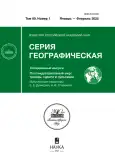The New Geography of Russian Oil Exports under Embargo and Price Cap
- Autores: Gromov A.I.1,2
-
Afiliações:
- Institute for Energy and Finance
- Gubkin Russian State University of Oil and Gas
- Edição: Volume 89, Nº 1 (2025): СПЕЦИАЛЬНЫЙ ВЫПУСК: ПОСТИНДУСТРИАЛЬНЫЙ МИР: ТРЕНДЫ, СДВИГИ И ПУЛЬСАЦИИ
- Páginas: 61-75
- Seção: Articles
- URL: https://journal-vniispk.ru/2587-5566/article/view/295257
- DOI: https://doi.org/10.31857/S2587556625010059
- EDN: https://elibrary.ru/CRURXD
- ID: 295257
Citar
Resumo
The article analyzes the current dynamics of Russian marine exports of oil and petroleum products under the conditions of embargo and price cap imposed by unfriendly countries following the start of the Russian Special Military Operation in Ukraine in February 2022. The article demonstrates that Russian oil exports have remained resilient to sanctions due to a shift towards alternative markets and active use of mechanisms to bypass Western non-market restrictions. Special attention is paid to the changing geography of Russian oil exports, which have rapidly shifted from the markets of Western countries to those of China, India, and Turkey. The changes in the tanker transportation of Russian oil and petroleum products following the embargo, as well as the tools used to bypass sanctions, including the marine transshipment of oil cargo and the use of a shadow fleet, are discussed in detail. The article analyzes the new economy of Russian oil exports under the conditions of external restrictions and the current trends in the pricing for Russian oil on the global market. The necessity of changing the existing pricing rules for Russian oil exports and switching to Russian pricing indicators, as well as Russian oil cargo insurance, is demonstrated. The task of creating an alternative financial and logistics framework for trading Russian oil cargos in the context of regionalization of international trade, due to the increasing influence of non-market sanctions, has been identified.
Palavras-chave
Texto integral
Sobre autores
A. Gromov
Institute for Energy and Finance; Gubkin Russian State University of Oil and Gas
Autor responsável pela correspondência
Email: a_gromov@fief.ru
Rússia, Moscow; Moscow
Bibliografia
- Eder L.V., Ozherel’eva I.V. Features of Russian petroleum export. Sovrem. Issled. Sots. Probl., 2010, no. 4, pp. 426–437. (In Russ.).
- Energeticheskie istoki i posledstviya global’nogo krizisa 2010-kh godov [Energy Origins and Consequences of the Global Crisis of the 2010s]. Bushuev V.V., Gromov A.I., Eds. Moscow: Energia Publ., 2012. 88 p.
- Gorkin A.P. Geografiya postindustrial’noi promyshlennosti (metodologiya i rezul’taty issledovanii, 1973–2012 gody) [Geography of Post-Industrial Industry (Methodology and Research Results, 1973–2012)]. Smolensk: Oikumena Publ., 2012. 346 p.
- Gorkin A.P., Gokhman V.M., Smirnyagin L.V. Territorial and production structure of industry (on the example of the system “Industry of a capitalist country”). Izv. Akad. Nauk SSSR, Ser. Geogr., 1976, no. 6, pp. 107–114. (In Russ.).
- Gromov A.I., Titov A.V. Restructuring of the Russian oil industry under embargo and the “price cap”. Energet. Polit., 2023, no. 5, pp. 6–19. (In Russ.).
- Khrushchev A.T. Geografiya promyshlennosti SSSR [Geography of Industry of the USSR]. Moscow: Mysl’ Publ., 1986. 416 p.
- Musaelyan L.A. Nauchnaya teoriya istoricheskogo protsessa: stanovlenie i sushchnost’ [Scientific Theory of the Historical Process: Formation and Essence]. Perm, 2015. 421 p.
- Pototskaya T.I. Geopolitical aspect of the contemporary transport and geographical position of Russia. Izv. Akad. Nauk, Ser. Geogr., 2018, no. 3, pp. 5–17. (In Russ.).
- https://doi.org/10.7868/s2587556618030020
- Pototskaya T.I. Geopolitical aspects of forming offshore strategies of Russian oil exports. Geogr. Vestn., 2020, no. 2, pp. 38–48. (In Russ.).
- Rodionova I.A. Changes in the sectoral structure and spatial organization of the world’s industry. Izv. Ural. Univ., 2009, no. 2, pp. 116–125. (In Russ.).
- Shcherbanin Yu.A., Golyzhnikova D.Yu. Export cargo flows via Russian maritime ports: oil cargo –some considerations. Ross. Vneshneekon. Vestn., 2019, no. 4, pp. 18–36. (In Russ.).
- Vardomskii L.B., Turaeva M.O. Razvitie transportnykh koridorov postsovetskogo prostranstva v usloviyakh sovremennykh geopoliticheskikh i ekonomicheskikh vyzovov: nauchnyi doklad [Development of Transport Corridors in the Post-Soviet Space: A Scientific Report]. Moscow: Inst. Ekon. RAN, 2018. 66 p.
Arquivos suplementares



















